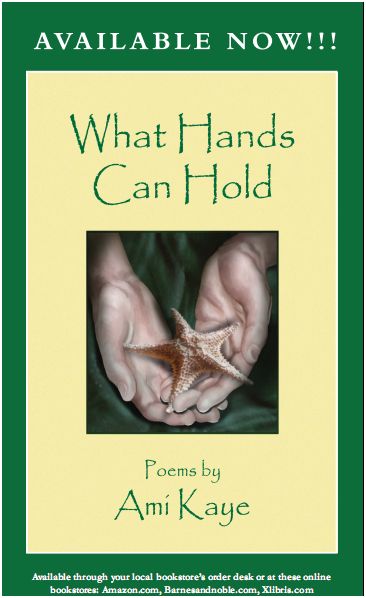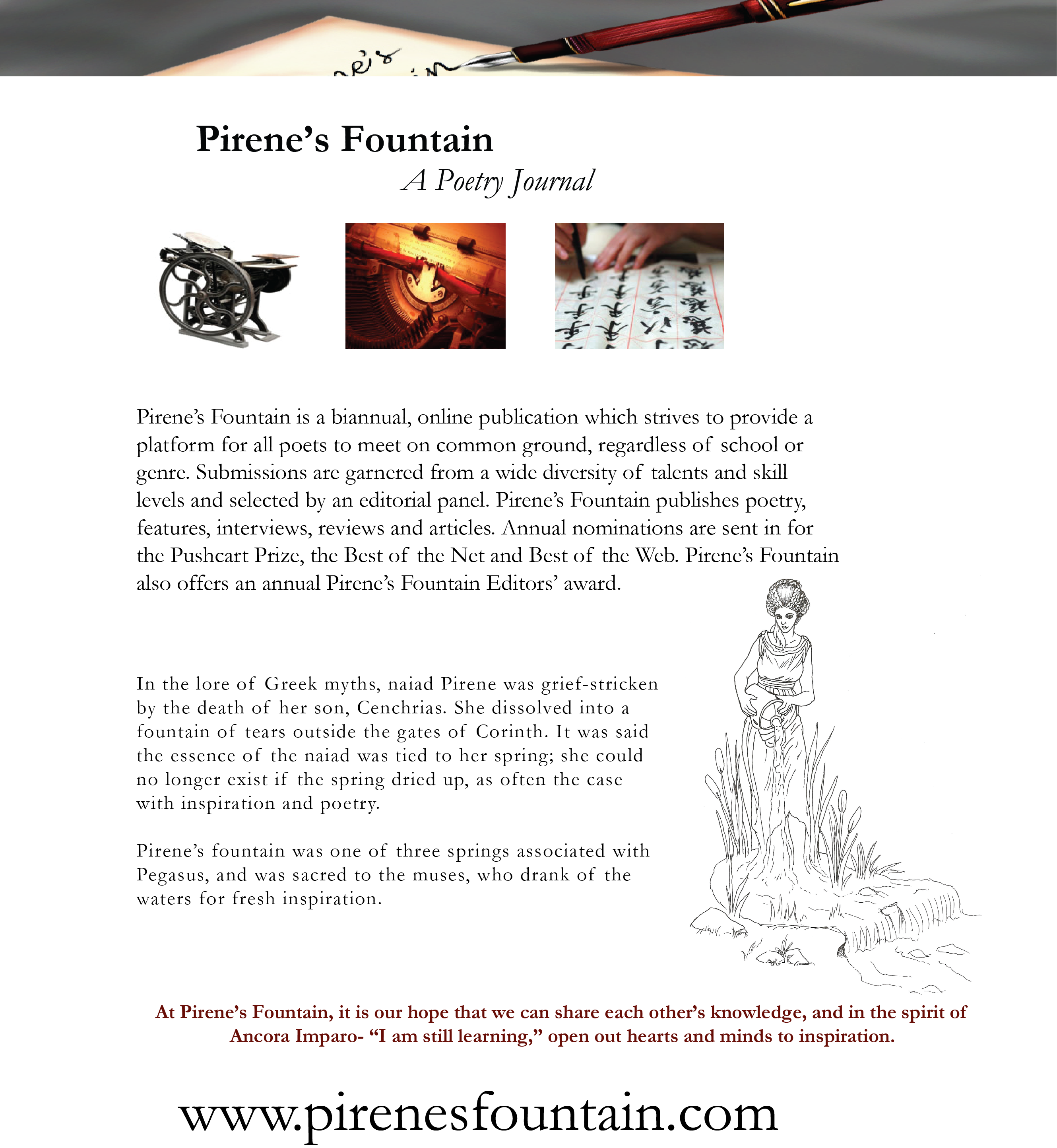what is your name?
Ami Kaye. Ami (uh-mee) is short for Amita, and not pronounced “Amy.”
how would you describe what you do?
I am a journal editor and writer. I publish and manage Pirene’s Fountain, a biannual online poetry journal which will mark its 5th year in January 2012. We’re a global community of editors with diverse styles and preferences. Pirene’s Fountain presents an eclectic blend of work from emerging authors as well as highly accomplished poets. We nominate for the “Best of the Net,” “Best of the Web” anthologies, and “The Pushcart Prize.” We also offer a PF editors’ award, open to all submitting poets but excluding featured/guest poets. Our emphasis is on the celebration of the written word, learning from and inspiring each other without bias for school or genre.
Apart from working on the journal, I also write poetry, reviews, features and articles, and interview various literary personalities. My poetry collection “What Hands Can Hold” was published last April, and a new book “Singer of the Ragas” is slated for release later this year.
what are you currently working on?
I am working on a new poetry book concept, two novel outlines, four book reviews, revising the above mentioned poetry manuscript, planning our Fall/Winter journal issue, as well as editing two anthologies, one of them a “Best of Pirene’s Fountain” for our 5th anniversary next year, and one is a special project to aid Japan, due for release in December 2011. People interested in participating can click on this link— http://pirenesfountain.com/submissions_japan.html
what has had the greatest influence on your work?
*All the writers who have left a piece of themselves in my heart.
*Travelling widely and learning about people and cultures around the world. Exposure to music, dance, concerts, dramas, films, anime, museums, art galleries and alternate art forms that have informed my thinking.
*My parents who provided a richly multicultural upbringing and outlook.
*My husband and sons who are extremely supportive of my work and continue to inspire me.
*People who have read my work/our journal and sent words of appreciation and support—I am grateful and humbled by that encouragement.
what is the greatest misconception about you or your work?
Sometimes submitting authors feel that if we do not accept a poem we find something wanting and are rejecting the author. In our case, we get a large volume of submissions. Rather than actively “reject” a work, we are more likely to look through the submissions and search for poems that leap off the page. Those are the poems we place on our list. Since we do have a cutoff number (It can vary between 40-60 poets, depending on how many pieces we take per poet), the ones who do not end up on the list are sent a note stating truthfully that their poem was “not accepted for this issue.” Sometimes that means we already picked a poem addressing a particular subject and did not want a duplicate, or that it just was not right in some way for this particular issue, but more often than not, it means someone else’s poem connected with us first.
Basically, we want to like poems sent to us because they make the content of our journal, so when we read, we are already in a mindset to accept rather than reject poems.
what do you see as the main strengths and weaknesses of the medium you work in?
The major strengths of our online medium are immediate and easy access to the journal and the ability to navigate back and from various resource links, such as author websites, vendor links to order books, etc. Also, the ability to make post-release corrections is convenient, something difficult or not possible at all in a print medium.
At one time online journals were not taken seriously, and submitting writers had the feeling that in some way they were inferior to their print counterparts. That perception is changing, I think. Now many more poets and writers are publishing their work online and are comfortable with the idea.
There is an entire discussion to be had on the sheer volume of work published online and how it affects the quality of literature and arts. I think that conversation will have to be addressed at another time, but suffice to say, I believe that good work will always stand out, and people desirous of finding such work will be able to do so online or in print. There are some people who do not have web access or some who prefer to “hold” the journal or book while reading, and may find it cumbersome to sit at a computer. However, now with iPad and products like the Kindle, people may find a way around those disadvantages.
how has technology impacted upon the work you do?
This is a fluid and fascinating time for publishing and writing. The internet has made it possible for journals without any monetary backing to run a professional grade organization, as is the case with Pirene’s Fountain, which is neither affiliated with an academic organization nor the recipient of any grants or donations. For us, going online saves us the overhead costs associated with a regular publishing company. We are able to deliver the magazine immediately upon release, distribute it to numerous readers and gain exposure via various networking sites and other venues. (It saves paper too!)
what’s the greatest piece of advice you would like to pass on?
Editorial boards serve the writer best if their journals run in a smooth and efficient manner. Writers who follow submission guidelines save organizational time for the journal and are also most likely to send in work that is most compatible with the journal requirements and aesthetics. A bit of courtesy on both sides can make the entire process more comfortable.
where can we find you online?
amikaye.com, pirenesfountain.com, Facebook, Pirene’s Fountain Poetry (a group on Facebook ) Goodreads, Twitter, Linked In and MySpace.
what are you reading at the moment?
If I start to name titles and authors I may not be able to stop, so I’ll just say I read reams of poetry every day…new stuff, old stuff and everything in between. I respect writers who employ a wide range of topics and treatment in their work. I enjoy fiction, history, mythology, well-written fantasy and science fiction. I read reviews, interviews and a lot of journals. I love work from Europe, China, Japan, Korea, and Africa, and dip occasionally into Zen philosophy, Sufi mysticism, and the rich, colorful tapestry of Indian writers. While I am perfectly harmless in a jewelry store, letting me loose in a bookstore can inflict major damage on a credit card.
what are you listening to at the moment?
My taste in music is as eclectic as my taste in literature—I’ve been listening to a mix of opera, jazz, classic rock and ghazals recently, but hands down, listening to my sons play piano together is the high point of any day! Their most recent pieces were Grieg’s concerto in A, and Rachmaninoff’s concerto no.2 arranged for two pianos.
anything else we should know?
The reason I greet every journal issue with enthusiasm is because I get to work with an awesome team—Oliver Lodge, Charles Morrison, Lark Vernon Timmons and Tony Walbran are not only talented editors and writers, they pitch in with features, interviews, submissions and all the other components that make Pirene’s Fountain a solid piece of work we can believe in. Katherine Herschler and Tracy McQueen from our production team tie the journal together seamlessly with a keen sense of aesthetics. The PF Team is dedicated, enthusiastic and serious about providing a unique platform for our poets, writers and readers. Add to that to a dynamic and generous writing community and I count myself as very, very lucky.


